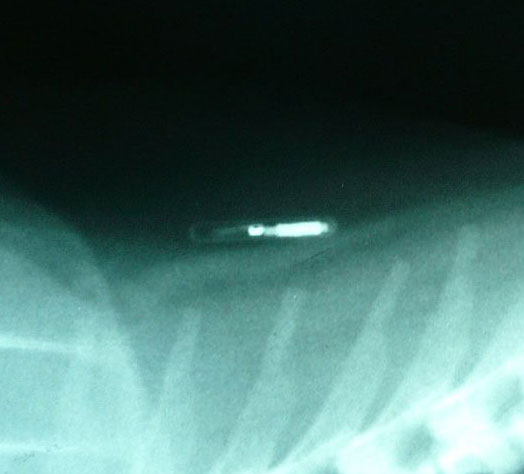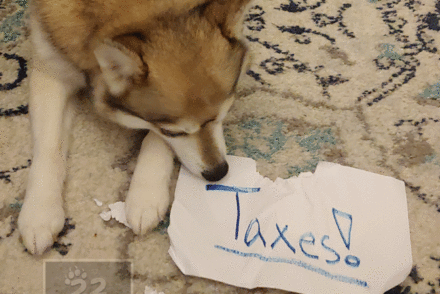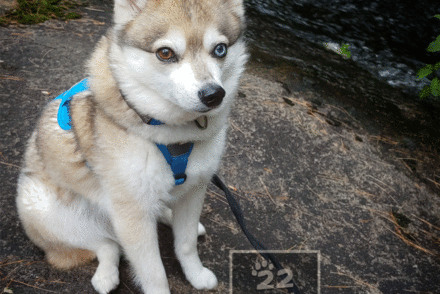Did you know there are ways you can register your pet’s microchip for free? Read on to learn how!
We’re moving….again. Ah the joys of renting. Although I didn’t write about it here, the whole process has been really stressful! By the time you read this post, though, we’ll be in our new place! We were very lucky to, after quite a long search, find an adorable little single family house with an amazing yard to rent. I SO wish we had been able to buy instead. The current housing market coupled with the fact that we weren’t really expecting to have to move right now left us unprepared.
Moving is a lot of work! Besides all the packing and physically moving, we have to worry about stuff like setting up utilities, and updating all our accounts with our new address. Kit and Fen will need new ID tags, new licenses, and I’ll have to update their microchip information.
Post Contents:
The 411 on Microchips

An x-ray image of a microchip. Photo via Joelmills, Creative Commons Attribution Share Alike 3.0 Unported license.
As most pet owners know, a microchip is an excellent means of permanent ID for our pets. They are about the size of a grain of rice, and in cats and dogs are normally inserted under the skin between the shoulder blades. Microchips themselves do not store any information besides a unique 9, 10, or 15 digit number. These numbers can be read by microchip readers most commonly by veterinarians or animal shelter staff.
When your pet is scanned and determined to have a microchip, the screen on the chip reader will display your pet’s unique microchip number, as well as who the manufacturer of the chip was. The chip number can also be searched on the AHAA Universal Pet Microchip Lookup website. The AHAA website displays registries that a chip number has been registered on, in order of the most recent registration first. Those registries can then be contacted and, as long as they have updated information on file, a missing pet’s owner can be contacted!
Registering Microchips
Microchips are useless if they are not registered! An unregistered microchip will mean that there is no owner information connected to that chip. Most microchip companies have their own registry. Most of them include the initial registration of your chip into the price of getting your pet microchipped. They then charge a fee later if you ever need to update your information. Others charge an annual subscription fee.
For example, my older dog, Kitsune, has a microchip from the company 24PetWatch. Way back when he was a puppy I got him microchipped during a clinic held by a local animal shelter. The price I paid to get him microchipped included registration. However, 12 years later, if I want to update my address through 24PetWatch I will have to pay to purchase a 24PetWatch membership. It’s $29.95 for the first year, then $19.95 a year after that. Or I could pay $94.95 for a lifetime membership.
Sadly, there is no universal microchip database. I wish there was, that would make things so much easier!
Free Microchip Registries
There are, however, a couple of free microchip registries.
- Found Animals Registry: From the research I did, the Michelson Found Animals Registry might be one of the closest things to a universal national registry, and registering your pet’s microchip through them is free.
- Free Pet Chip Registry: I have never used this registry myself, but they are also a free pet microchip registry.
What I recommend When It Comes to Registering Microchips
Free registries are awesome, but having your contact information updated through a free registry only will be useless if the vet/shelter scanning your found pet doesn’t do enough digging to discover what registries you used. Microchip scanners display not only your pet’s unique ID number, but the chip manufacturer as well. Some shelter workers, busy as they are, don’t always go beyond calling the chip’s manufacturer. That sadly means that you could have your updated information saved on as many registries as you want, but if it’s not updated through the chip’s original manufacturer, and that’s the only company the shelter calls after scanning your pet, then you’d be out of luck.
I know no one wants to spend money if they don’t have too. If you can, I recommend registering your pet’s microchip through their chip’s manufacturer. The free registries can be great as back up or secondary registries, or as a way to update your information quickly until you can afford to pay to also update them with the chip’s manufacturer.
Microchips Should Not Replace Traditional ID Tags
If my pet is already microchipped, and the chip is registered, why would they also need a traditional ID tag? Microchips are not the end all be all to recovering lost pets. Updated ID tags are still the best way to get your lost pet returned to you as quickly as possible. Reading your phone number and/or address off an ID tag is so much easier than having to take a pet to a shelter or vet to get him/her scanned for a chip.
Now to find some cute new tags for Kit and Fen! That’s one of the fun parts of moving, after all. Comment below and let me know if you recommend any specific brand of ID tags for small dogs. I’d also love to hear your experience using one of the free microchip registries, if you’ve used either of them before.

Chip scanner image via Steffen Heinz, Creative Commons Attribution Share Alike 3.0 Unported license.





15 Comments
Thank you so much for this information! I didn’t know that AAHA had a microchip registry, and didn’t know about these two free registries. I’m definitely going to register both Icy and Phoebe on these sites. We have moved several times since installing these chips, but none of the registries charge just for updating phone number and address – in my opinion that’s pretty rotten. Mine only charge if you get their services to find lost pets; contacting Vets, creating flyers, etc.
The AAHA site is cool and was really helpful when I was trying to remember what type of chips my boys had so I could update their info, lol. For some reason I had paperwork telling me what their chip numbers are but not who the chip manufacture was.
You’re lucky that you were able to update your info without getting charged! I was reading that supposedly 24petwatch used to have a way to update your info for free, but I couldn’t find that option when I was on their site recently. It would let me update my phone number for free, but not my address.
Great information! And congratulations on your new home with the yard. I’m certain Kit and Fen love it! When I adopted my dog, I was told he wasn’t chipped. However, when I took him to the vet the next day, they scanned him and he was chipped. There was no data associated with it. I have Henry registered on Found Animals. I liked that it was free and easy to make changes.
Henry received a tag as a gift, which is just adorable from tagsforhope.com. It’s a bit pricey, but the purchase goes to help those animals considered “unadoptable”.
Thanks for all the detailed information! Enjoy your new home and yard!
Thank you! We were blessed to have a yard before this move too but our new one is a lot nicer. 🙂 The boys love it!
I’ve never heard of tagsforhope.com, I’ll have to check them out!
We only have one microchip registry in New Zealand I am glad to say it is NZCAR and they are brilliant, they also have an option to add identification photographs which are helpful if your dog has distinctive markings. What is just as important is Check the Chip Day. I say this because our Dot Kitten lost her chip (yes really!) and we had to replace it!!!!
Honestly, though, I would rather pay and know my details are safe , secure and easy to find by the experts when I need them most. Sometimes free just doesn’t cut it.
We can also add things like photos and pet info, depending on what chip registry you’re using. But it’s frustrating that there are so many different registries verses just having one universal one.
I’ve heard that chips can stop working, and even migrate either to other locations or even sometimes out of your pet. Crazy! I have my vet check my boys’ chips during their yearly physicals just in case.
I’m glad the free registries exist here because you know there are people who don’t want too, or can’t, pay to keep their chip info up to date. The free registries are not perfect and I agree that paying is probably the best option, but the free registries are for sure better than nothing!
Microchipping is so so important and many lost dogs that land up in shelters did not have a microchip or the chip was not updated. Layla also wears a tag from Pethub which has a barcode so if the gets lost her tag can be scanned by a phone and her profile pops up with all information including vet, microchip number etc plus I get an email the minute it gets scanned. I love it and it keeps me relaxed.
Good luck in your new house.
When I was searching for new tags for my two I actually saw quite a few with barcodes instead of printing your contact info on them! It’s an interesting idea, but I opted for the traditional tags because I still feel like it’s by far the easiest for people to read. Not everyone has scanners on their phone, or wants to download them. Thanks so much for the well wishes 🙂
Ah, I wish I knew that; we had to pay to register each time. I still think it’s worth it, though.
I think it is too, although I feel like it’s a little shady to make you pay to update your contact info after you already pay for the chip itself. Ah well.
One of my dogs is microchipped, but I couldn’t update my information. I’ll have to try using Found Animals Registry.
I had a really hard time updating Fen’s microchip the last time we moved! I could not, for the life of me, figure out who the manufacture was. Not even the AHAA site would tell me. The Found Animals Registry is great, as long as you know the microchip number you should be able to update it there.
This is great information. There are a lot of ways that we can save money when owning a pet, but I’m a firm believer that this is one area that every pet owner should invest in. As you said, a microchip is useless if no one can find the contact information associated with it. I would rather invest in a paid service. This peace of mind is worth every penny.
I’m with you. However, I think the free registries can be great for people tight on cash, for example. Moving can be SO expensive, and they could always use the free registries to update their info ASAP then go back and pay the fees to also update with the manufacturer later on. I updated Fen’s chip through the Found Animals Registry as a stop gap because I could not, for the life of me, figure out who manufactured his chip. His vet was, thankfully, able to help me figure it out but it took awhile to get an appointment, and I didn’t want his chip info to be outdated while we waited to see his vet. So I do think there are some instances where the free registries can be super helpful!
[…] your pet is micro-chipped, make sure to update his/her microchip information with your new/current address and phone number ASAP. Dogs and cats should wear updated ID tags. […]